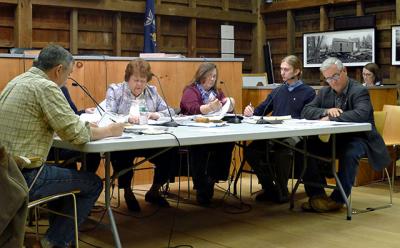Sag Harbor Seeks Trustee Help

A representative of the Sag Harbor Village Board’s waterways advisory committee asked the East Hampton Town Trustees at a meeting on Monday to support a bill that would grant the village authority over waterways beyond the present 1,500-foot boundary.
Appearing at the request of Mayor Sandra Schroeder, John Parker told the trustees that the moorings and anchored vessels in the area outside the breakwater, which number as many as 70 in the summer and are now unregulated, has resulted in boats sinking and washing up on the breakwater or Havens Beach, with one disintegrating for the past 15 months in the middle of the mooring field. Debris, fuel, or other contaminants enter the water under such circumstances, he said. Further, it has become clear that many of the vessels outside the harbormaster’s jurisdiction are improperly discharging sewage.
“It’s very frustrating for the harbormaster specifically, and for the rest of the village, to anticipate problems, to see boats that aren’t moored properly but not have authority to do anything about it,” Mr. Parker said. The bill, introduced in the State Assembly by Fred W. Thiele Jr., who is the Sag Harbor Village attorney as well as an assemblyman, passed the Senate in June but has not been voted on in the Assembly.
The trustees, who manage most of the town’s beaches, waterways, and bottomlands on behalf of the public, have always been protective of their jurisdiction. The matter was initially discussed at a trustee meeting on Dec. 8, before the current majority took office. Diane McNally, then the presiding officer, or clerk, said the bill was not to be taken lightly. Bill Taylor, who became one of the trustees’ two deputy clerks this month, said at that meeting that the trustees should assert jurisdiction.
Robert Bori, the Sag Harbor Village harbormaster, said in an interview last week that “the thought was to get an idea of who’s out there” — beyond the village’s 1,500-foot jurisdiction — “and get some kind of order. It wasn’t by any means to try to cut into the trustees’ jurisdiction. But we’re getting the brunt of it: All the boats, the dinghies, come ashore here. We’re taking all their garbage, on and on. We’ve got to get some idea of what’s going on.”
In an interview on Tuesday, Mr. Parker reasserted the village’s respect for trustee jurisdiction. “We’d like to cooperatively deal with the problem. There is no intent whatsoever to infringe on any right of East Hampton or the trustees.”
The trustees seem amenable to a cooperative relationship. Ms. McNally spoke of “jurisdictional boundaries getting more and more clouded,” rather than clarified. “I would rather see it get delineated and finalized, and then perhaps an understanding of the problem Sag Harbor is having now . . . a way to allow for the increased enforcement over a larger section of the water without using that word ‘jurisdiction.’ ” She suggested that Mr. Thiele and Rick Whalen, the trustees’ newly appointed attorney, jointly determine respective responsibilities.
Pat Mansir, a deputy clerk presiding at the meeting in the absence of Francis Bock, the newly elected clerk, assigned Ms. McNally, Mr. Taylor, Mr. Whalen, and Tyler Armstrong to a subcommittee to follow up on Sag Harbor’s request.
In other news at the meeting, the trustees debated legislation drafted by the town board to make permanent the ban on alcoholic beverages within a designated area during lifeguard-protected hours on summer weekends and holidays at Indian Wells Beach in Amagansett. The ban, enacted midway through the summer of 2014 and re-enacted last year, was supported by a bare majority of the prior trustee panel, with several members disputing beachgoers’ complaints of excessive drinking and poor behavior of large groups of young adults.
Ms. Mansir said that “alcohol, the hot sun, and saltwater don’t mix” and never will. Mr. Taylor and James Grimes, a new trustee, agreed.
Ms. McNally opposed a permanent ban, however. “Forever is a long, long time,” she said of a permanent ban, adding that after the trustees had compromised with the town board, a sign implying a 24-hour, year-round ban was erected. “Proper signage of what was agreed to last year would be okay,” she said.
Mr. Grimes said he sees the issue from the viewpoint of an emergency medical technician who has responded to many calls to beaches. “A few beers is fine,” he said, “but when you catch a kid who’s had a few beers, a few roofies” — a powerful sedative — “and is running naked through the dunes because he thinks he’s on fire. . . .” A ban, he said, “makes it easier for law enforcement.”
Elaine Jones, chair of the East Hampton Independence Party, told the trustees at the meeting that “I have always opposed drinking on the beach. At Indian Wells, my mother went, I went, my daughter went, but my grandchildren can’t go. If two people want a glass of wine, fine, but now you don’t get two people. These people are causing problems.” Alcohol, she said, “should be banned on all beaches.”
Of the seven of the nine members of the board present, only Ms. McNally opposed the proposal. Councilwoman Sylvia Overby of the town board, who arrived while the meeting was in progress, encouraged the trustees to make their position known.
